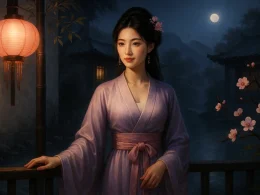On cold waters, my lone oar touches celestial spheres,
As if riding a raft to ask the way of the starry seers.
Though the azure void holds infinite beauty and grace,
The name "Star-Guest" still brings a troubled look to my face.
Original Poem
「早行」
陆龟蒙
水寒孤棹触天文,直似乘槎去问津。
纵使碧虚无限好,客星名字也愁人。
Interpretation
This heptasyllabic quatrain was composed by Lu Guimeng during the late Tang Dynasty. Living in reclusion in Fuli, Suzhou, Lu styled himself "an idle wanderer of rivers and lakes." Amid the turmoil of the late Tang—marked by corrupt governance, intense factional strife, and unrecognized talent—he harbored aspirations to contribute to the world but found his official path blocked, turning instead to nature for solace. This poem was written during an early morning boat journey, where the vastness of the river and sky inspired him to infuse the loneliness of travel with reflections on his own life.
First Couplet: "水寒孤棹触天文,直似乘槎去问津。"
Shuǐ hán gū zhào chù tiānwén, zhí sì chéng chá qù wèn jīn.
In cold waters, the lone oar seems to touch the celestial patterns;
Straight as if riding a raft to seek the heavenly ford.
This couplet uses exaggeration to depict the nighttime river journey. The river stretches wide, making the boat seem to sail within the Milky Way; "touch the celestial patterns" (触天文 chù tiānwén) vividly conveys the solitude and fantastical atmosphere. "Riding a raft to seek the ford" (乘槎去问津 chéng chá qù wèn jīn) alludes to an ancient legend where a man rafted to the Milky Way and asked the Herdboy Star for direction, symbolizing the traveler’s inquiry into his future amid solitude. The poet uses this to reflect his own situation, blending whimsy with underlying loneliness.
Second Couplet: "纵使碧虚无限好,客星名字也愁人。"
Zòngshǐ bì xū wúxiàn hǎo, kèxīng míngzì yě chóu rén.
Even were the azure void infinitely beautiful,
The name "guest star" would still bring sorrow.
Here, the tone shifts to抒情 (shūqíng, lyrical expression). "Azure void" (碧虚 bì xū) refers to the sky, which, though magnificent, cannot comfort a wandering heart. "Guest star" (客星 kèxīng) was an ancient astronomical phenomenon, often interpreted as an omen of disaster or exile. The poet uses this to metaphorize his own rootlessness and unrecognized talent, filling the lines with personal resonance—celebrating the sky’s grandeur while conveying profound melancholy.
Holistic Appreciation
The poem consistently employs astronomical imagery, seamlessly blending the solitary boat journey with the Milky Way and stars to create a transcendent realm. The poet describes both the travel scenery and his inner reflections: marveling at the night sky’s vast beauty while feeling sorrow due to the "guest star." Scene and emotion merge, reality and imagination combine, resulting in a work that is both magical and rich with life’s flavor.
Lu Guimeng often imbued small scenes with grand sentiments. This poem uses images like "lone oar" (孤棹 gū zhào), "celestial patterns" (天文 tiānwén), and "guest star" (客星 kèxīng) to express the loneliness of travel and the anguish of unrecognized talent, while also conveying philosophical musings on the universe and human existence.
Artistic Merits
- Interplay of real and imagined, whimsical fancy: "Touch the celestial patterns" and "riding a raft to seek the ford" are exaggerated and virtual, merging the boat journey with the Milky Way, exuding romanticism and showcasing late Tang literati’s imaginative flexibility.
- Natural allusions, profound meaning: "Riding a raft to seek the ford" derives from the Milky Way legend; "guest star" comes from astronomical records—the poet uses these to self-metaphorize, avoiding stiffness while carrying deep significance.
- Scene infused with feeling, emotion-scenery fusion: Surface descriptions of night travel and stars convey travel weariness and the grief of unrecognized talent. Scenic depiction and mental state reflect each other, enhancing emotional impact.
- Concise language, expansive conception: Twenty-eight characters encompass the boat journey, night sky, stars, and personal circumstances—succinct yet comprehensive, with a broad artistic conception (意境 yìjìng), achieving the effect of "revealing grandeur in smallness."
- Clear and profound tone, deep lament: The surface portrays the night scene’s fresh beauty and vastness, but within lies the sorrow of life’s wanderings—the tone is clear yet deeply resonant, reflecting Lu’s characteristic style of "embedding depth within freshness."
Insights
This is not merely a travel poem but a deeply reflective work. It reminds us that life’s journey is like a lone boat at night—seemingly touching the stars, yet often marked by rootlessness and unease. However beautiful the external world, it cannot conceal inner loneliness and melancholy. Reading it, we not only experience nature’s vastness and poetry but also appreciate the spiritual resilience of ancients facing adversity.
About the Poet

Lu Guimeng (陆龟蒙 ?– c. 881 CE), a native of Suzhou, Jiangsu, was a Late Tang dynasty writer and agronomist. After failing the imperial examinations, he retreated to a reclusive life in Puli, Songjiang. He formed a famous literary partnership with the poet Pi Rixiu, and the pair are often referred to collectively as "Pi-Lu." His poetry is known for its social satire and a style that is incisive yet subtly restrained. His inclusion in the Biographies of Talents of the Tangunderscores his significance. The modern writer Lu Xun famously praised his essays, noting that they provided "a sharp radiance piercing through a world of muddle". Lu Guimeng is regarded as a uniquely distinctive voice in the literary scene of the late Tang.












